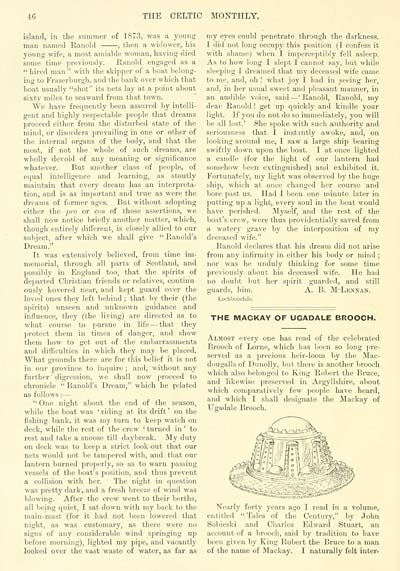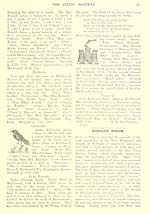Blair Collection > Celtic monthly > Volume 1, 1893
(60)
Download files
Complete book:
Individual page:
Thumbnail gallery: Grid view | List view

46
THE CELTIC MONTHLY.
island, in the summer of 1873, was a young
man named Ranold , then a widower, Lis
young wife, a most amiable woman, having died
some time previously. Ranold engaged as a
" hired man " with the skipper of a boat belong-
ing to Fraserburgh, and the bank over which that
boat usually "shot" its nets lay at a point about
sixty miles to seaward from that town.
We have frequently been assured by intelli-
gent and highly respectable people that dreams
proceed either from the disturbed state of the
mind, or disorders prevailing in one or other of
the internal organs of the body, and that the
most, if not the whole of such dreams, are
wholly devoid of any meaning or significance
whatever. But another class of people, of
equal intelligence and learning, as stoutly
maintain that every (beam has an interpreta-
tion, and is as important and true as were the
dreams of former ages. But without adopting
either the pro or con of those assertions, we
shall now notice briefly another matter, which,
though entirely different, is closely allied to our
subject, after which we shall give " Ranold's
Dream."
It was extensively believed, from time im-
memorial, through all parts of Scotland, and
possibly in England too, that the spirits of
departed Christian friends or relatives, continu-
ously hovered near, and kept guard over the
loved ones they left behind ; that by their (the
spirits) unseen and unknown guidance and
influence, they (the living) are directed as to
what course to pursue in life — that they
protect them in times of danger, and show
them how to get out of the embarrassments
and difficulties in which they may be placed.
What grounds there are for this belief it is not
in our province to inquire ; and, without any
further ' digression, we shall now proceed to
chronicle " Ranolds Dream," which he related
as follows : —
"One night about the end of the season,
while the boat was 'riding at its drift' on the
fishing bank, it was my turn to keep watch on
deck, while the rest of the crew 'turned in' to
rest and take a snoose till daybreak. 51 y duty
on deck was to keep a strict look-out that our
nets would not be tempered with, and that our
lantern burned properly, so as to warn passing
vessels of the boat's position, and thus prevenf
a collision with her. The night in question
was pretty dark, and a fresh breeze of wind was
blowing. After the crew went to their berths,
all being quiet, I sal down with my back to the
main-mast (for it had not been lowered that
night, as was customary, as I lure were no
signs of any considerable wind springing up
before morning), lighted my pipe, and vacantly
looked over the vast waste of water, as far as
my eyes could penetrate through the darkness.
1 did not long occupy this position (L confess it
with shame) when 1 imperceptibly fell asleep.
As to how long I slept I cannot say, but while
sleeping 1 dreamed that my deceased wife came
to me, and, oh ! what joy 1 bad in seeing her,
and, iii her usual sweet and pleasant manner, in
an audible voice, said — 'Ranold, Ranold, my
dear Ranold ! get up quickly and kindle your
light. If you do not do so immediately, you will
be all lost.' She spoke with such authority and
seriousness that I instantly awoke, and, on
looking around me, I saw a large ship bearing
swiftly down upon the boat. I at once lighted
a candle (for the light of our lantern had
somehow been extinguished) and exhibited it.
Fortunately, my light was observed by the huge
ship, which at once changed her course and
bore past us. Had I been one minute later in
putting up a light, every soul in the boat would
have perished. Myself, and the rest of the
boat's crew, were thus providentially saved from
a watery grave by the interposition of my
deceased wife."
Ranold declares that his dream did not arise
from any infirmity in either his body or mind;
nor was he unduly thinking for some time
previously about his deceased wife. He had
no doubt but her spirit guarded, and still
guards, him. A. B. MLennan.
I.ii. hi. .M-, bl- .
THE MACKAY OF UGADALE BROOCH.
Almost every one has read of the celebrated
Brooch of Lome, which has been so long pre-
served as a precious heir-loom by the Mac-
dougalls of Dunolly, but there is another brooch
which also belonged to King Robert the Bruce,
and likewise preserved in Argyllshire, about
which comparatively few people have beard,
and which I shall designate the Mackay of
Ugadale Brooch.
Nearly forty years ago I read in a volume,
entitled "Tales of the Century," by John
Sobieski and Charles Edward Stuart, an
account of a brooch, said by tradition to have
been given by King Roberl the Bruce to a man
of the name of Mackay. I naturally felt inter-
THE CELTIC MONTHLY.
island, in the summer of 1873, was a young
man named Ranold , then a widower, Lis
young wife, a most amiable woman, having died
some time previously. Ranold engaged as a
" hired man " with the skipper of a boat belong-
ing to Fraserburgh, and the bank over which that
boat usually "shot" its nets lay at a point about
sixty miles to seaward from that town.
We have frequently been assured by intelli-
gent and highly respectable people that dreams
proceed either from the disturbed state of the
mind, or disorders prevailing in one or other of
the internal organs of the body, and that the
most, if not the whole of such dreams, are
wholly devoid of any meaning or significance
whatever. But another class of people, of
equal intelligence and learning, as stoutly
maintain that every (beam has an interpreta-
tion, and is as important and true as were the
dreams of former ages. But without adopting
either the pro or con of those assertions, we
shall now notice briefly another matter, which,
though entirely different, is closely allied to our
subject, after which we shall give " Ranold's
Dream."
It was extensively believed, from time im-
memorial, through all parts of Scotland, and
possibly in England too, that the spirits of
departed Christian friends or relatives, continu-
ously hovered near, and kept guard over the
loved ones they left behind ; that by their (the
spirits) unseen and unknown guidance and
influence, they (the living) are directed as to
what course to pursue in life — that they
protect them in times of danger, and show
them how to get out of the embarrassments
and difficulties in which they may be placed.
What grounds there are for this belief it is not
in our province to inquire ; and, without any
further ' digression, we shall now proceed to
chronicle " Ranolds Dream," which he related
as follows : —
"One night about the end of the season,
while the boat was 'riding at its drift' on the
fishing bank, it was my turn to keep watch on
deck, while the rest of the crew 'turned in' to
rest and take a snoose till daybreak. 51 y duty
on deck was to keep a strict look-out that our
nets would not be tempered with, and that our
lantern burned properly, so as to warn passing
vessels of the boat's position, and thus prevenf
a collision with her. The night in question
was pretty dark, and a fresh breeze of wind was
blowing. After the crew went to their berths,
all being quiet, I sal down with my back to the
main-mast (for it had not been lowered that
night, as was customary, as I lure were no
signs of any considerable wind springing up
before morning), lighted my pipe, and vacantly
looked over the vast waste of water, as far as
my eyes could penetrate through the darkness.
1 did not long occupy this position (L confess it
with shame) when 1 imperceptibly fell asleep.
As to how long I slept I cannot say, but while
sleeping 1 dreamed that my deceased wife came
to me, and, oh ! what joy 1 bad in seeing her,
and, iii her usual sweet and pleasant manner, in
an audible voice, said — 'Ranold, Ranold, my
dear Ranold ! get up quickly and kindle your
light. If you do not do so immediately, you will
be all lost.' She spoke with such authority and
seriousness that I instantly awoke, and, on
looking around me, I saw a large ship bearing
swiftly down upon the boat. I at once lighted
a candle (for the light of our lantern had
somehow been extinguished) and exhibited it.
Fortunately, my light was observed by the huge
ship, which at once changed her course and
bore past us. Had I been one minute later in
putting up a light, every soul in the boat would
have perished. Myself, and the rest of the
boat's crew, were thus providentially saved from
a watery grave by the interposition of my
deceased wife."
Ranold declares that his dream did not arise
from any infirmity in either his body or mind;
nor was he unduly thinking for some time
previously about his deceased wife. He had
no doubt but her spirit guarded, and still
guards, him. A. B. MLennan.
I.ii. hi. .M-, bl- .
THE MACKAY OF UGADALE BROOCH.
Almost every one has read of the celebrated
Brooch of Lome, which has been so long pre-
served as a precious heir-loom by the Mac-
dougalls of Dunolly, but there is another brooch
which also belonged to King Robert the Bruce,
and likewise preserved in Argyllshire, about
which comparatively few people have beard,
and which I shall designate the Mackay of
Ugadale Brooch.
Nearly forty years ago I read in a volume,
entitled "Tales of the Century," by John
Sobieski and Charles Edward Stuart, an
account of a brooch, said by tradition to have
been given by King Roberl the Bruce to a man
of the name of Mackay. I naturally felt inter-
Set display mode to: Large image | Transcription
Images and transcriptions on this page, including medium image downloads, may be used under the Creative Commons Attribution 4.0 International Licence unless otherwise stated. ![]()
| Early Gaelic Book Collections > Blair Collection > Celtic monthly > Volume 1, 1893 > (60) |
|---|
| Permanent URL | https://digital.nls.uk/75842047 |
|---|
| Description | Vol. I. |
|---|---|
| Shelfmark | Blair.54 |
| Attribution and copyright: |
|
| Description | A selection of books from a collection of more than 500 titles, mostly on religious and literary topics. Also includes some material dealing with other Celtic languages and societies. Collection created towards the end of the 19th century by Lady Evelyn Stewart Murray. |
|---|
| Description | Selected items from five 'Special and Named Printed Collections'. Includes books in Gaelic and other Celtic languages, works about the Gaels, their languages, literature, culture and history. |
|---|

